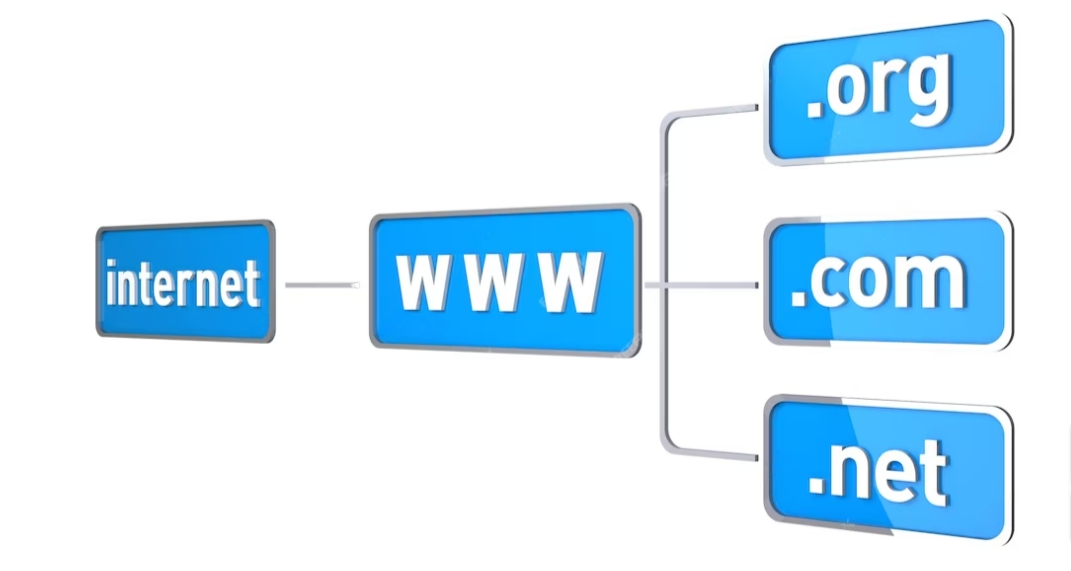What’s the Difference Between .org vs .com vs .net?
If you’ve ever ventured into the world of website domains, you’ve likely encountered a variety of extensions like .org, .com, and .net. These domain extensions, also known as top-level domains (TLDs), play a pivotal role in defining a website’s identity and purpose. In this digital age, understanding the nuances of .org, .com, and .net can make all the difference in choosing the right domain for your online presence
.org – Organization or Nonprofit:
The .org domain extension was initially created with the intention of serving nonprofit organizations. Over the years, its scope has expanded to include a broader range of entities. Despite this broadening of eligibility, .org domains are still most commonly associated with organizations that have a non-commercial, mission-driven focus. These organizations often utilize .org to convey their commitment to a cause, whether it’s related to humanitarian efforts, open-source projects, educational initiatives, or community-building endeavors.
The .org extension has a strong reputation for trustworthiness, credibility, and authenticity. When individuals or entities choose a .org domain, they are signaling to their audience that their primary purpose goes beyond commercial gain. Prominent examples of .org websites include wikipedia.org, which hosts the well-known collaborative online encyclopedia, and redcross.org, representing the globally recognized humanitarian organization.
.com – Commercial or Business:
In the domain world, .com reigns supreme as the most widely recognized and utilized TLD. Originally intended for commercial entities, the .com extension has become the go-to choice for businesses, corporations, e-commerce websites, and entrepreneurs looking to establish a prominent online presence. Its abbreviation for “commercial” underscores its fundamental association with commerce and business activities.
The immense popularity of .com is driven by its global recognition and memorability. When individuals think of a website, they often assume it ends with .com by default. This universality makes .com an attractive choice for businesses seeking to reach a broad, international audience. Industry giants like Google (google.com) and Amazon (amazon.com) prominently feature .com domains as the foundation of their online identities.
.net – Network or Tech-Related:
Originally designated for network-related websites, the .net TLD has evolved to encompass a wider spectrum of online platforms. While it retains its association with networking, infrastructure, and technology-related services, .net domains are also chosen by various tech startups, internet service providers, and businesses with a strong tech-centric focus.
The .net extension conveys an image of connectivity and technology. For tech-driven companies, it signals their commitment to providing network-based solutions and services. Websites like cisco.net, associated with the multinational technology corporation, and bit.ly, a link management platform, opt for .net extensions to emphasize their tech-related offerings.
Nature of Your Website:
The primary consideration when selecting a top-level domain (TLD) is the fundamental nature and objectives of your website. Your choice should harmonize with your website’s core purpose and identity. Here’s a more in-depth exploration of this aspect:
– .org – Organization or Nonprofit: If your website is centered around non-commercial, mission-driven initiatives, .org is a suitable choice. It has broadened its eligibility over time and is now used by various entities, including nonprofits, clubs, open-source projects, and individuals. However, it remains most strongly associated with organizations committed to a cause. These organizations often aim to make a positive impact, whether it’s related to humanitarian efforts, education, community building, or open information sharing.
– .com – Commercial or Business: For businesses, corporations, e-commerce websites, and those engaged in commercial activities, .com is the go-to TLD. Its abbreviation for “commercial” underscores its direct association with commerce and business endeavors. .com domains are renowned for their global recognition and memorability. When people think of websites, they often assume they end with .com by default. This universality makes .com a compelling choice for businesses seeking to reach a broad, international audience.
– .net – Network or Tech-Related: While .net was originally designated for network-related websites, it has evolved to encompass a broader spectrum of online platforms. It retains its connection to networking, technology, infrastructure, and tech-related services. .net domains are also chosen by tech startups, internet service providers, and businesses with a strong focus on technology and connectivity. When you opt for a .net extension, you convey an image of connectivity and tech-driven solutions. This can be ideal for companies committed to providing network-based services and technology-related offerings.
Global Reach:
Consider your website’s goals regarding audience reach. If your objective is to connect with a global audience, .com is often the safest choice due to its universal recognition. This TLD is commonly associated with international visibility and is favored by companies looking to reach a broad customer base across borders. However, it’s essential to recognize that .org and .net can also have global appeal when their purpose aligns with international interests. Your choice should reflect your intentions regarding the scope of your website’s reach.
Domain Availability:
The availability of domain names can vary for each TLD. When selecting a domain name, you may encounter limitations in terms of availability. Popular and concise domain names with .com extensions can be highly sought after and, as a result, may be more challenging to secure. In such cases, you may need to be creative and flexible in choosing a domain name that aligns with your selected extension. Consider domain availability as part of your decision-making process.
SEO and Branding:
The top-level domain you choose can impact your page load speed, search engine rankings, and brand perception. Search engines take into account the domain extension as a factor in ranking search results. For instance, a .com domain is often considered more trustworthy and can positively affect search engine optimization (SEO). Additionally, your domain extension can influence the way your audience perceives your brand. A well-chosen TLD can communicate a sense of credibility, professionalism, and relevance to your target audience. It’s essential to evaluate how your choice may affect SEO and branding, as well as page load speed, when deciding on the right TLD for your website.
Wrap Up
Choosing the right domain extension, whether it’s .org, .com, or .net, is a pivotal decision for your online presence. Each extension signifies a different purpose and identity. .org is for organizations and mission-driven entities, .com is universally recognized for commercial use, and .net is tech-oriented.
Your choice should align with your website’s mission and target audience. Consider availability, SEO, and branding implications when making this decision. Ultimately, your domain extension should accurately convey your digital identity and goals.







